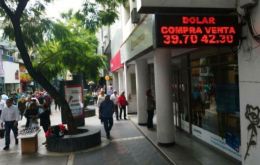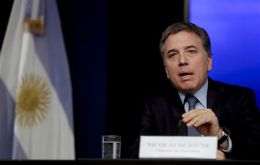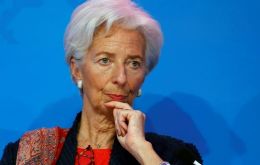MercoPress. South Atlantic News Agency
Tag: Nicolas Dujovne
-
Saturday, March 16th 2019 - 10:15 UTC
IMF prepared to help Argentina stabilize exchange market volatility in election year

Argentina’s central bank wants to license market makers to help stabilize its embattled peso currency when the Treasury starts newly announced dollar sales in April. The bank hopes the market makers, dealers who agree to buy and sell at set prices, would bolster liquidity in the exchange market to help avoid the sharp gyrations the peso has suffered in recent weeks when it hit a record low of 42.5 pesos per dollar in thin trading.
-
Tuesday, February 12th 2019 - 10:30 UTC
IMF mission in Argentina to collect data on compliance of the standby loan accord

An IMF team is back in Buenos Aires to review the Argentine economy performance and how it is complying with the fiscal and monetary conditions established in the stand-by US$ 57 billion loan agreed last year. The head of the mission Roberto Cardarelli is scheduled to meet ministers, central bank officials, members of Congress from the ruling coalition and opposition, academia and different lobbies.
-
Saturday, January 19th 2019 - 09:13 UTC
Argentina complies with IMF 2018 primary fiscal deficit target: 2.4% of GDP

Argentina outperformed its primary fiscal deficit target for 2018, Economy Minister Nicolas Dujovne said on Friday, assuring that the country’s standby finance deal with the International Monetary Fund remains on track.
-
Friday, November 2nd 2018 - 09:03 UTC
Multilateral banks provide Argentina three loans totaling US$ 1.8 billion

The World Bank and the Inter-American Development Bank are providing Argentina with three loans totaling more than US$1.8 billion, aiming to help the country cope with financial difficulties and support citizens most at risk.
-
Friday, October 26th 2018 - 00:48 UTC
Dujovne foresees Argentina's October inflation “will be bad”

Argentina's Finance Minister Nicolás Dujovne Tuesday admitted October's inflation “will be bad” due to the September carryover. But he expected “a clear drop” for November.
-
Tuesday, October 23rd 2018 - 08:53 UTC
Argentina's primary deficit falls to 1.1% of GDP, the lowest since 2012

Argentina's primary deficit fell to 1.1% of Gross Domestic Product (GDP) between January and September this year, compared to 2.1% over the same period in 2017, the Finance Ministry announced on Monday.
-
Friday, October 19th 2018 - 10:18 UTC
Dollar, prices go up in inflation-ridden Argentina

The US dollar rose 22 cents against the Argentine peso and closed at a 1 US$/ AR$37.50 parity on Thursday. It was the second day in a row for an upward trend following seven straight slumps.
-
Tuesday, October 9th 2018 - 21:29 UTC
IMF foresees 2.6% GDP drop for Argentina this year - inflation 40%

Argentina's GDP will fall 2.6% and inflation will reach 40% this year, according to the International Monetary Fund's Global Perspectives Report released Monday at the beginning of the body's annual Assembly in Bali, Indonesia.
-
Friday, October 5th 2018 - 09:03 UTC
Industrial activity in Argentina down 5.6% in August and 0.8% in last 12 months

August data for industry was only a slightly better figure than the previous month – in July, a decline of minus 5.7% was witnessed. In June, the sharpest, most pronounced fall of the year was witnessed: 8.1%, year-on-year.
-
Thursday, September 27th 2018 - 09:19 UTC
Argentine Peso with trading band and zero growth monetary supply policy

The International Monetary Fund Managing Director Christine Lagarde, speaking at a news conference in New York alongside Argentine Economy Minister Nicolas Dujovne, said IMF was “significantly frontloading” disbursements under the program adding the Argentine central bank had agreed as part of the deal to allow the peso currency to float freely and would only intervene in the foreign exchange market in extreme circumstances.
